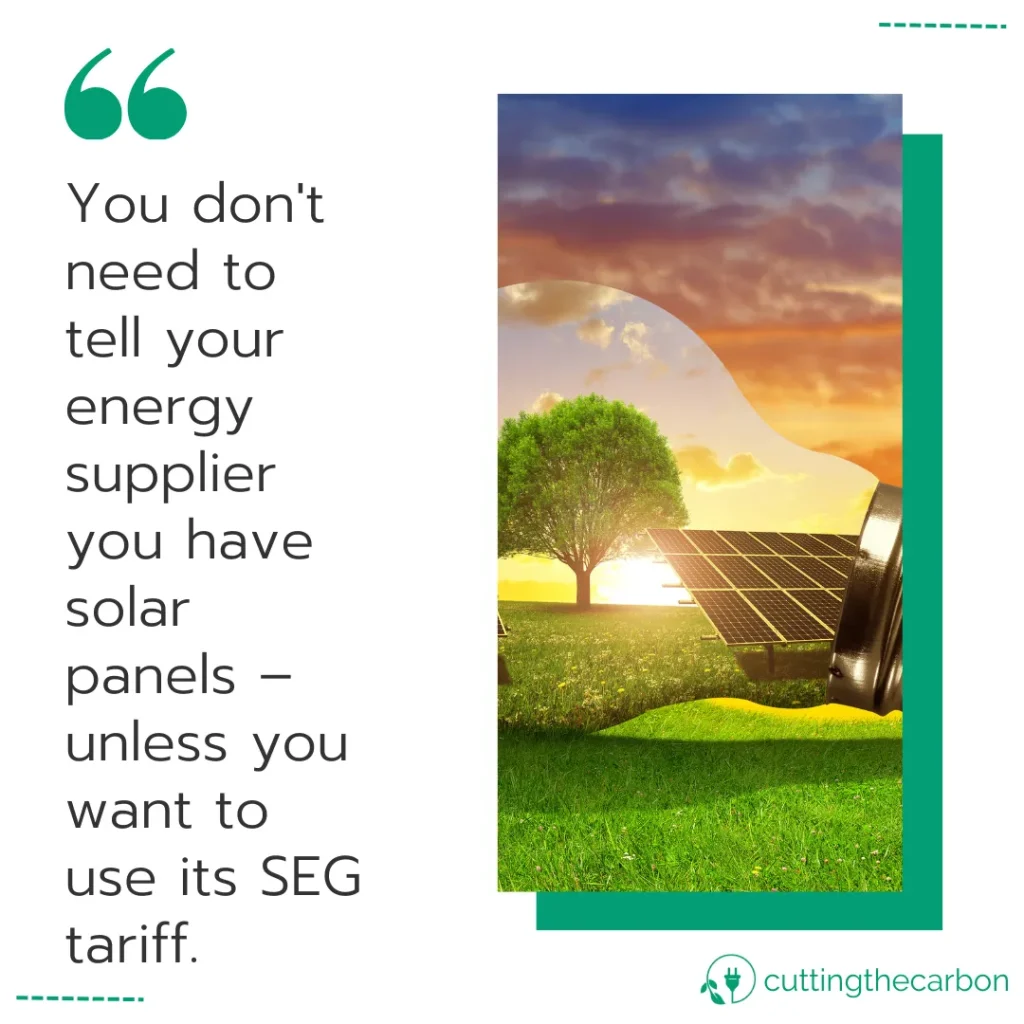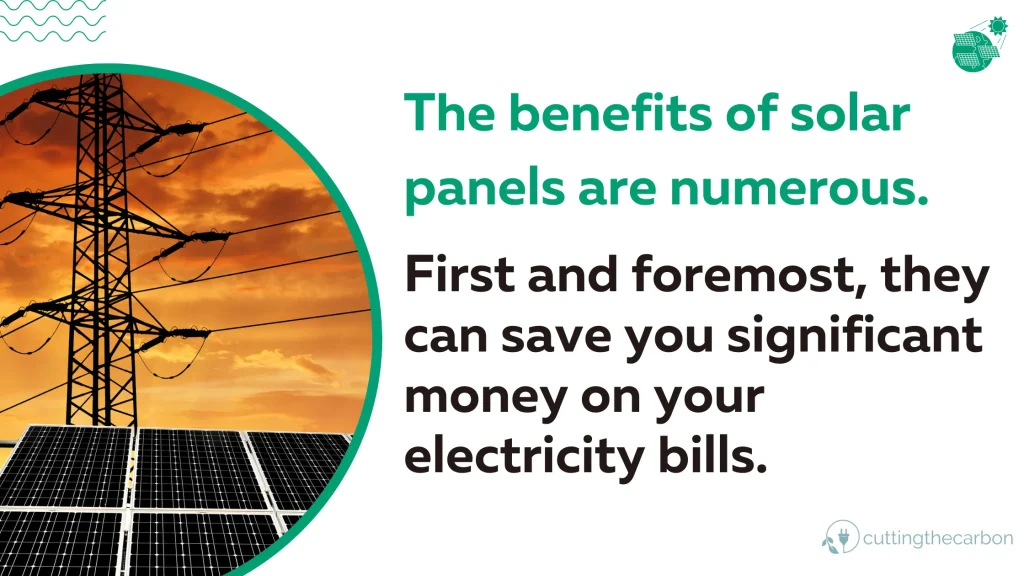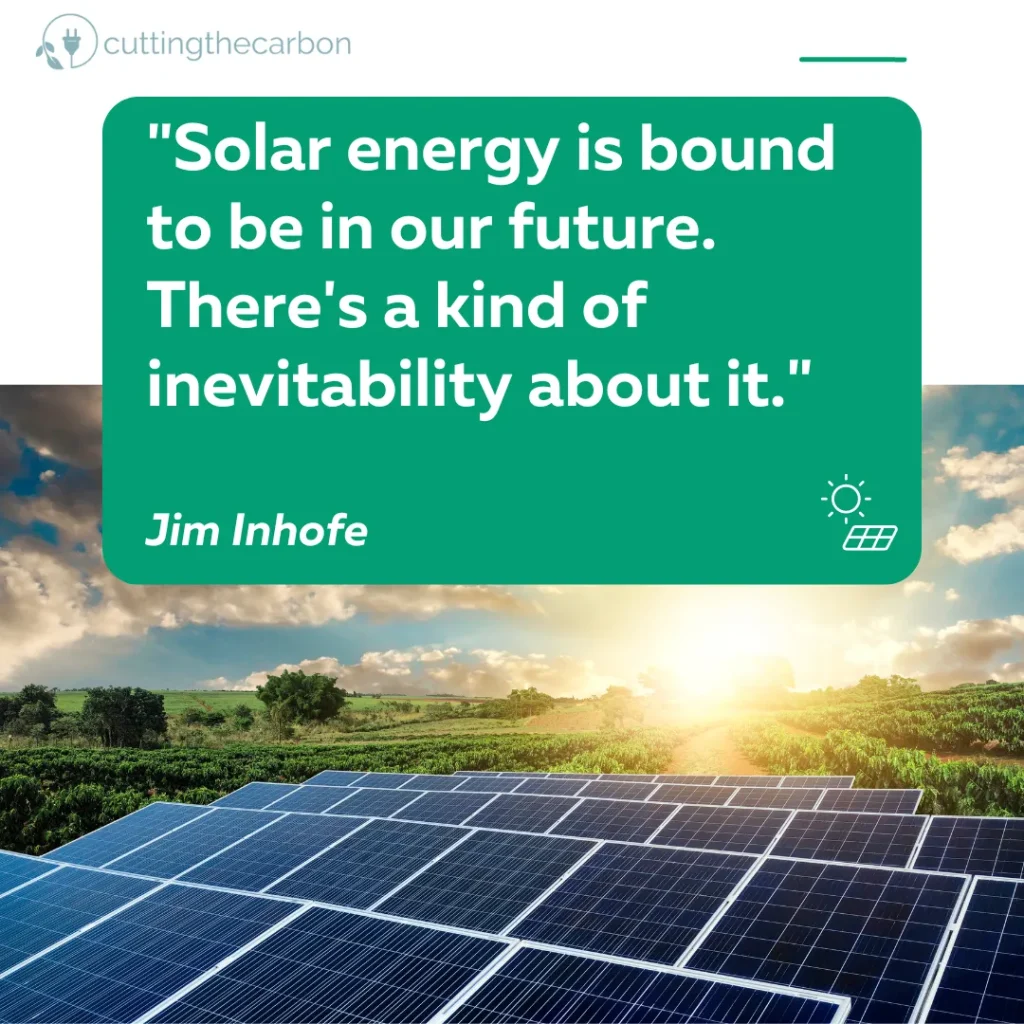Are you considering going green with solar panels, or do you already have them installed? One common query is, do I need to tell my electricity supplier I have solar panels?
This guide will help you navigate the important yet often confusing world of solar energy and its interaction with your electricity provider.
Some Points To Consider:
- You don’t need to tell your energy supplier you have solar panels. However, it is a good idea to inform your electricity supplier about your solar panels so that you can receive appropriate export tariffs and financial rewards for the renewable energy you generate.
- Installation of solar panels does not restrict you to a specific energy supplier; you can choose and switch between different suppliers.
- Switching energy suppliers will not affect the arrangement or payment of subsidies for exporting excess renewable electricity from your solar panels.

Why Install Solar Panels?
Investing in solar panel installations represents a transformative step towards energy independence. This sustainable energy source helps you save on sky-high electricity bills and significantly reduces your carbon footprint.
As non-renewable resources such as coal and natural gas become increasingly scarce and expensive, renewable electricity gained from photovoltaic (PV) panels presents a financially sound and environmentally friendly solution.
Solar panels harness the sun’s rays to generate green energy for daily use, while any excess is fed back into the current grid. Energy suppliers like British Gas or EDF pay homeowners for this valuable contribution through export tariffs under the Smart Export Guarantee (SEG).
Launched in 2020 to replace the Feed-in-Tariffs (FIT), this programme rewards households that put home-generated renewable electricity onto the national power grid.
Therefore, shifting from the traditional electricity consumption model to solar energy systems provides multi-faceted benefits encompassing economic gain, environmental conservation and fuel savings.
The Importance of Informing Your Energy Supplier
Informing your energy supplier about your solar panels is crucial to ensure you receive the appropriate export tariffs and maintain a transparent partnership.
Understanding Export Tariffs
Export tariffs play a vital role in the financial rewards offered to solar panel owners. An export tariff is money energy companies pay for the electricity homeowners generate and inject back into the local electricity grid.
This not only encourages renewable energy generation but also provides a worthy incentive for transitioning away from traditional models of electricity consumption.
It’s key to note that with schemes like Feed-in-Tariffs (FIT) or Smart Export Guarantee (SEG), your FIT/SEG licensee who pays this subsidy doesn’t necessarily have to be your current energy supplier.
You can hold separate contracts for your energy supply and these export payments, offering greater flexibility in efficiently managing your solar energy system.
Plus, rest easy knowing that Ofgem sets these payment rates and remains constant across all suppliers, eliminating the need to compare or switch for better deals constantly.
| Some Points To Consider |
|---|
| The only entity you need to inform about your solar installation is the company managing the export tariff, should you decide to opt for a tariff different from your current energy supplier. |
| Your solar panel installer should ideally inform the DNO within 28 days post the commissioning of your solar installation. The commissioning process entails thorough testing and inspection to ensure the safe generation of electricity. |
| After completing the 28 days, ensure your installer has forwarded the relevant commissioning documents to your DNO. If not, persistently remind them until they comply. |
| The only entity you need to inform about your solar installation is the company managing the export tariff, should you opt for a tariff different from your current energy supplier. |
| If your solar panels were installed by a previous owner and the original installer is no longer in business, it’s possible to approach the DNO directly to secure approval for your system. |

The Impact on Tariff Arrangements
Solar panel installation significantly impacts tariff arrangements. Solar panels mean you can benefit from Smart Export Guarantee (SEG), an incentive scheme that pays homeowners to export their home-generated green energy back to the grid.
The money earned is based on the export tariff set by Ofgem and paid out by energy companies. Notably, your FIT/SEG licensee handles these payouts and doesn’t have to be your regular energy provider.
As such, changing energy suppliers won’t affect this arrangement or disrupt your export payments. It’s essential to communicate with both parties – the energy supplier and FIT/SEG licensee – about any changes in circumstances to ensure accurate billing and compliance with relevant regulations.
How to Communicate with Your Energy Supplier about Solar Panels
- Contact your energy supplier either through their customer service hotline or by visiting their website.
- Inform them that you have recently installed solar panels on your property.
- Please provide them with the necessary details, such as the size and capacity of your solar panel system.
- Ask if they have any specific requirements or guidelines for solar panel installations.
- Inquire about any financial rewards or compensation plans they offer for households with solar panels.
- Seek guidance on integrating your solar panel system with the electricity grid and ensuring safety compliance.
- Discuss any concerns or questions you may have regarding your solar panel installation.
- Keep a record of all communications with your energy supplier for reference purposes.

How to switch to a different licensee?
Switching to a different licensee for your solar panels is a simple process. Unlike traditional energy, solar panels do not lock you in with a specific supplier. So, if you want to switch, you can do so without complications.
You can choose an energy supplier that offers better rates or suits your needs. It’s important to note that changing suppliers does not affect your tariff arrangement or export payments.
If you switch, you will still receive the same subsidies and benefits for generating renewable electricity from your solar panels.
Which energy suppliers pay export tariffs?
Many energy suppliers in the UK offer export tariffs for customers with solar panels. These include well-known companies such as British Gas, EDF, E.ON, Npower, ScottishPower, Octopus Energy and OVO Energy.
Do I Need To Tell My Electricity Supplier I Have Solar Panels Conclusion
It is important to inform your electricity supplier about your solar panels. This ensures you can take advantage of export tariffs or payments for the green energy you generate.
Additionally, communicating with your supplier helps maintain an open and transparent partnership in achieving a cleaner and more sustainable energy future.
FAQs
Will solar panels cover my electric bill?
Yes, solar panels can potentially cover your entire electricity bill if the system is sized correctly for your energy usage. However, this depends on factors such as the amount of sunlight your location receives, the efficiency of your solar panels, and your home’s energy consumption.
What information should I provide to my electricity supplier about my solar panels?
You should provide details such as the capacity of your solar panel system, its installation date, and any relevant certification or documentation provided by the installer.
Will informing my electricity supplier about my solar panels affect my energy bills?
Informing your electricity supplier about your solar panels can impact your energy bills as they may offer special rates or incentives for customers with renewable energy systems. It is recommended to discuss this with your supplier directly.
Can I continue using the grid when I have solar panels?
Yes, even if you have installed solar panels, you can still use the grid for supplemental power during periods of low sunlight or high energy demand. This is known as a grid-tied system and allows you to benefit from both sources of electricity.

